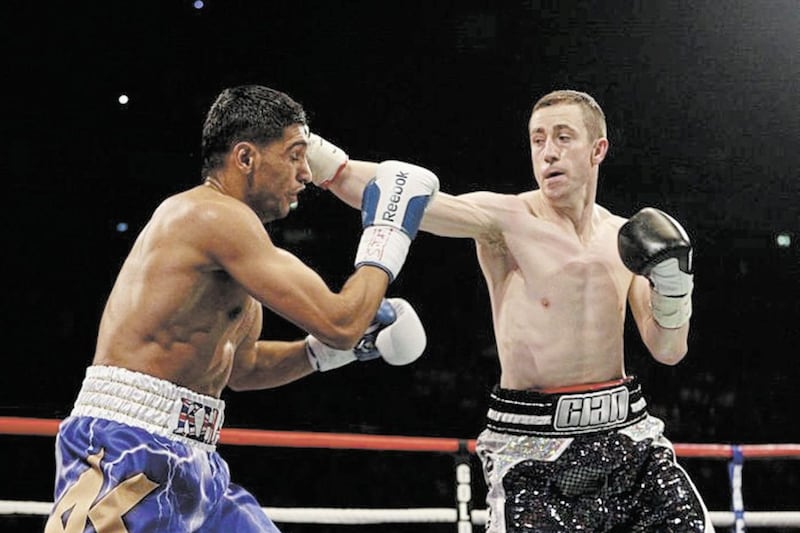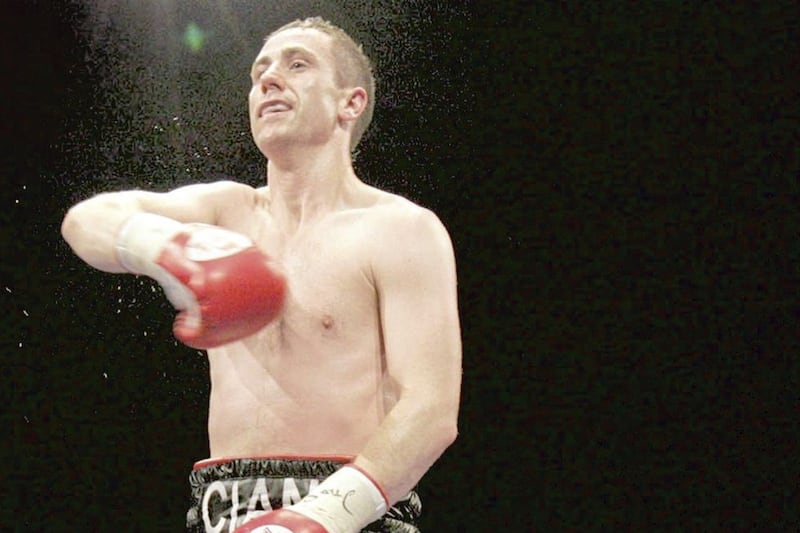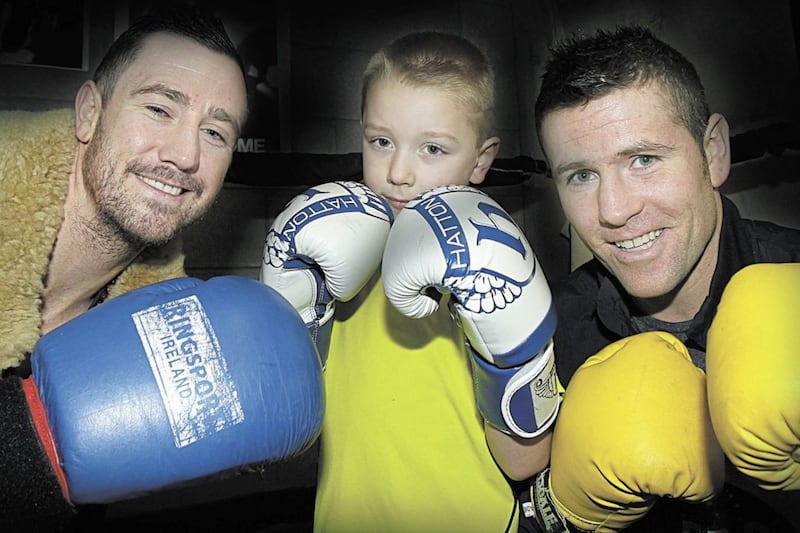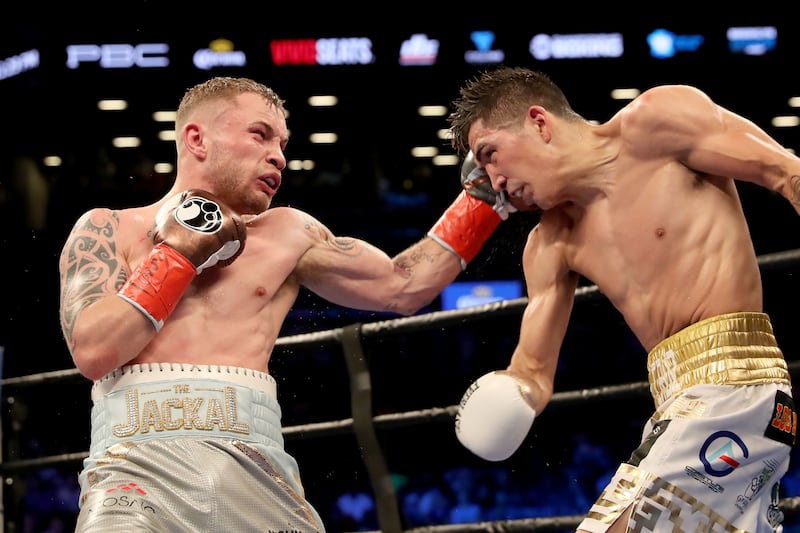NINE years have passed now but they still talk about that night in Manchester when Paul McCloskey battled Amir Khan for the WBA light-welterweight title.
“Ah McCloskey, that was a great night,” they tell him. As the years go by, ‘Dudey’ can understand why people still talk about his title shot and he is proud. But it took time for him to see it like that.
“Some people say it was the best night of their life,” he says.
“Unfortunately for me, I was stuck in a room all day waiting to get a fight and the fight was a disaster for me so, as far as I was concerned, it was a pretty shit night.
“But for people to come and tell you it was one of the best days of their life… Well, it’s nice to know that you brought something like that to them.”
McCloskey versus Khan was top of the bill at Manchester Arena on April 16, 2011. An army of fans followed the Dungiven man, who’d won the European title on an unforgettable night in Magherafelt just six months previously, over to England and roared him on for five rounds against Great Britain’s Olympic golden boy Khan, who was making the fourth defence of his title.
With his hands characteristically low in the southpaw stance, McCloskey used those razor-sharp reflexes of his to dip and slip Khan’s shots but while he concentrated on defence the Englishman’s accurate right hand did enough to win the early rounds.
Nine years on McCloskey says, like he always has, that his safety-first start was part of the plan. He intended to weather the storm and then go to work in the second half of the fight but he never got the chance.
A clash of heads opened a gash over his right eye and, after taking advice from the doctor at ringside, referee Luis Pabon stopped it with 30 seconds left of the sixth. McCloskey begged ti be allowed to continue but Pabon would have none of it and Khan, who was ahead on all three scorecards at the time, kept his title.
Although he says he moved on from the loss “quite quickly” McCloskey will always wonder what might have been.
“Sometimes things happen, for whatever reason, but the reality is – as I’ve said about three million times - the fight should never have been stopped,” he says.
“But it was stopped and there’s nothing I can do about it. Why it was stopped I don’t know. I’m not saying I would have won the fight if it had of went on but the plan was to win by knockout because I was never getting the win on points if it went 12 rounds. I knew I had to win without the judges making a play in it.
“He never did one ounce of damage, he never hurt me. He won rounds but he never landed any telling shots. I actually thought he was gassing, he was breathing heavily, in the last round. He underestimated me, he was thinking: ‘He’s fought nobody really and I’ll go in here and blow him away in two rounds’.
“He never did that. I’ve always had a good engine and he doesn’t go well late on in fights so I’d love to have got into the second half and landed a few shots. I might not have hurt him but we all know he’s got a dodgy-enough oul chin.
“I could have probably landed a few more early on but the plan was to make him miss as much as possible, which was working, and then see what I could do in the later rounds. Unfortunately I never got the chance to do that so we’ll never know now…”
‘Cheated not defeated’ was the battle cry and with irate Matchroom promoter Barry Hearn hopping with rage, the McCloskey camp lobbied the WBA for a rematch but Khan wasn’t interested.
“I promise you if it had gone two more rounds he would have been knocked out,” he claimed but he refused to prove it in the ring and McCloskey was forced to move on. He decided to prove a point against hammer-handed Colombian Breidis Prescott who had previously knocked out Khan in 54 seconds.
“I didn’t feel like I lost to Khan,” he says.
“If I’d have got knocked out in one round it would have been a painful one to swallow but you’d have had to say ‘I was beat there’. But the way the whole thing finished, mentally it didn’t feel like a defeat and it actually made me more hungry to try and push on.”
Prescott had blitzed Khan in the first round of their meeting three years earlier and it didn’t take long for McCloskey to understand how he’d been able to do that.
“Prescott could fuckin’ hit,” he says with a been-there-got-the-t-shirt chuckle.
“He wasn’t the best boxer I fought but he was the biggest puncher and he was massive for the weight. He had reach and height over me and he could bang.
“I’d class him as your typical South American. He came from a poor background, he had the talent and if he had lived the life of a purist fighter and had the power to last 12 rounds he would have been a world champion. For three or four rounds he could punch like a mule, but after that the power left him. If he could punch for 12 rounds, I wouldn’t have gone 12 with him because he could hit… Very hard.
“I sucked it all in over the first couple of rounds but then the power did leave him thank God because you couldn’t take that all night.”
McCloskey’s pre-fight plan had been to “box the lugs off” Prescott but, as they say in boxing: ‘Everybody has a plan until they get punched in the face’. He was down in the first and came off worst in the second and third rounds, so when the bell went to start the fourth he was already 40-36 behind on the scorecards.
He decided to fight fire with fire and took it to Prescott after that and his change of tactics worked. He turned the tide over the second half of the fight and came out with a narrow, but unanimous, points win.
His bruised body took time to recover and when he was ready to return, Dudey was matched against vastly-experienced American DeMarcus ‘Chop Chop’ Corley. He needed a win, and the more impressive the better, to make ground towards a second title shot but the result was another contentious stoppage defeat. Again he had been behind on the scorecards but looked to be turning it around when referee Ian John Lewis shocked everyone in the King’s Hall to wave it off in the 10th.
He bounced back against Manuel Perez to win the WBA Inter-continental belt but had split with long-term cornerman and coach John Breen by the time he dipped through the ropes for what turned out to be the final time to take on Dave Ryan in December 2013.
“I thought I won that fight (he put Ryan down in the fourth) but I fought shit, I was nowhere near my best,” he admits.
“You have to be honest and ask yourself: I am doing what I could have done three or four years ago? The most important thing in any kind of career is looking in the mirror and being honest with yourself. The fight game is unforgiving in the sense that you’re getting hit and damage is being done so if you’re not up to what you were it’s maybe time to call it quits or down the line you could be sitting talking to yourself.
“Too many punches to the head is not good for you so it’s about getting in, winning, making a few quid and then getting out. Nowadays with nutrition and lifestyle, sportsmen are going on a lot longer now – until their late 30s – and it’s getting to the stage where you have to ask: Should this be allowed? You don’t anyone to stay too long and then, 20 years down the line, see the effects of them fights.”
He says that retirement, hanging up his gloves, was like the “flick of a switch” and, like a Breidis Prescott right hook, it took him a while to get over it.
“It takes you a couple of years to adjust,” he said.
“Lucky for me I had a job to go into but I wouldn’t fancy having to leave boxing thinking: ‘Right, what’s the next move’. I had two years when I had to readjust to everything in my life, when I was thinking: ‘Where am I going? What am I doing?’ That’s when it’s important to have your family and your good friends around you.
“It’s like being a drug addict and going ‘cold turkey’. Boxing was my drug at that stage of my life.
“The funny thing about it is that it stops overnight. You know you’re going to finish your career sometime but you don’t think about it until it’s actually over and it’s like the flick of a switch. You go: ‘F**k me… it’s over now…’ That’s my description of it. You can’t prepare for it until it actually happens. You can imagine what it might feel like but until it happens you don’t know.”
So was he hard to be around as he got used to life without boxing? That’s probably not for him to say.
“I don’t think I was but my wife might say different,” he counters with a laugh.
“But I’d say I was, aye. I’m lucky because I have an amazing wife and a brilliant family around me. Without that I could see why some sports people go down the wrong path. I can see how that could happen. If you had the wrong people around you, you could end up doing the wrong things. I’ve been very fortunate that way, I’ve got people who are there for me, there’s not there to take anything off you, they’re there because they care about you.”
Nowadays his life is devoted to the people he cares about – his wife and his four boys. None of them box and McCloskey certainly isn’t going to push them into it, although he says: “If they want to box I’ll take them”.
“My third boy Gareth is talking about going to boxing but I’m not going to be there to hold his hand – he’ll have to go and learn it if he wants to because any child of mine who wants to box is going to be compared to me and I don’t want to put that pressure on them because I’ve pushed them into it, I want them to go because they want to because if they go themselves they’ll enjoy it more.
“At the minute they all play football and hurling and they’re enjoying that.”
He still watches the fights on TV from time to time but he’s not involved any more either. He closed a door in his mind after the Ryan loss and if he reopens it he risks losing his heart and soul to boxing once again.
“Part of me would love to get back into it,” he says.
“But I know that if I got back into the coaching side of it I’d be as crazy at that as I was as a boxer.
“As a boxer I lived the life and there’s no point in doing it unless you’re going to live like that. I know I’d be the same as a coach and I have a young family now and my priority is to be there for them so I’m not willing to dedicate my time to anything but them anymore.
“I’m not saying I’d never get back into it but my time is about my family now.”
Alongside his family he is busy running his family shop and his restaurant ‘Silkys’ was doing good business in Dungiven before the coronavirus pandemic caused him to shut its doors. Boxing helped set him up and he’s grateful for that and, although it has taken time, he can look back with pride now on what he achieved.
“My mindset going in was to win as much as I could, earn as much as I could and get out,” he says.
“I made the choice to get into the game and I made the choice to get out of it whereas some people are forced into leaving because of defeat or injury.
“When I left I wasn’t satisfied but I’m never satisfied. If I’d have won five world titles I wouldn’t be happy because I want to win as much as I can, that’s just my mentality. But I’m proud of what I did.”
He should be.







